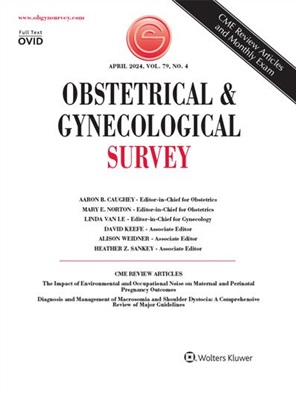A Systematic Review and Meta-analysis of Cell-Free DNA Testing for Detection of Fetal Sex Chromosome Aneuploidy
IF 4.3
4区 医学
Q1 OBSTETRICS & GYNECOLOGY
引用次数: 0
Abstract
ABSTRACT Noninvasive prenatal screening has become a valuable tool in detecting a variety of disorders and abnormalities, including sex chromosome aneuploidies (SCAs). The test uses cell-free DNA (cfDNA) analysis to identify risk for chromosomal abnormalities, which can then be more fully investigated using other tests. Much of previous research focused on cfDNA has assessed autosomal aneuploidies, but few studies have specifically focused on SCAs. The aim of this systematic review and meta-analysis was to assess the accuracy of cfDNA testing in identifying SCAs in singleton pregnancies. Studies were identified by keywords associated with cfDNA, SCA, and noninvasive prenatal testing, and studies were included based on relevance. Inclusion criteria were limited to singleton pregnancies that underwent cfDNA testing with confirmation by diagnostic genetic testing between January 1, 2010 and December 1, 2021. A total of 21 articles were selected for the final meta-analysis. All included studies reported results for monosomy X (45,X), representing nearly 13,000 tests with 254 confirmed positive results, 133 false-positives, and 18 false-negatives. Estimated sensitivity based on this sample was 98.8%, with specificity of 99.4%. Positive and negative predictive values were 14.5% and 100%, respectively. Of the 21 included studies, 16 also reported results for Klinefelter syndrome (47,XXY), representing just over 11,000 tests with 62 confirmed positive results, 10 false-positives, and 11 false-negatives. Estimated sensitivity was 100% and specificity was 100%, with positive predictive value of 97.7% and negative predictive value of 100%. Thirteen of 21 studies included reported results for triple X syndrome (47,XXX), representing roughly 10,000 tests with 38 confirmed positive results, 18 false-positives, and 1 false-negative. This showed an estimated sensitivity of 100% and specificity of 99.9%, with positive predictive value of 61.6% and negative predictive value of 100%. Finally, 9 of the studies included in this meta-analysis reported results for Jacobs syndrome (47,XYY), representing approximately 8500 tests with 22 confirmed positive results, 2 false-positives, and no false-negatives. This led to an estimated sensitivity and specificity of 100%, with positive and negative predictive values also 100%. These results provide evidence that cfDNA testing is effective in identification of SCAs in pregnancies at high risk. This particular population limits the generalizability of the findings but adds to the literature surrounding the effectiveness and accuracy of this method. The analysis used strict criteria to define the studies that were included, yet still included a large sample of tests (12,000), which adds to the statistical and practical significance of the analysis. Generalizing the findings of this study is difficult based on both the fact that the sample did not include low-risk individuals and that positive predictive values varied greatly with prevalence, impacting clinical significance. Overall, cfDNA testing for SCAs has both high sensitivity and specificity, along with a high negative predictive value of 99.99% or above for each SCA examined. Further research is needed to confirm these findings and extend knowledge to a more diverse population.无细胞DNA检测检测胎儿性染色体非整倍体的系统综述和荟萃分析
无创产前筛查已成为检测各种疾病和异常的宝贵工具,包括性染色体非整倍体(SCAs)。该测试使用无细胞DNA (cfDNA)分析来确定染色体异常的风险,然后可以使用其他测试更全面地调查。以前的许多研究都集中在cfDNA上,评估了常染色体非整倍体,但很少有研究专门关注sca。本系统综述和荟萃分析的目的是评估cfDNA检测在单胎妊娠中识别sca的准确性。通过与cfDNA、SCA和无创产前检测相关的关键词识别研究,并根据相关性纳入研究。纳入标准仅限于2010年1月1日至2021年12月1日期间接受cfDNA检测并经诊断性基因检测确认的单胎妊娠。总共选择了21篇文章进行最终的meta分析。所有纳入的研究报告了X单体的结果(45,X),涉及近13,000次检测,其中254次确认阳性结果,133次假阳性结果和18次假阴性结果。该样本的敏感性为98.8%,特异性为99.4%。阳性预测值为14.5%,阴性预测值为100%。在纳入的21项研究中,16项也报告了Klinefelter综合征的结果(47,XXY),代表超过11,000项测试,其中62例确诊阳性结果,10例假阳性结果,11例假阴性结果。估计敏感性100%,特异性100%,阳性预测值97.7%,阴性预测值100%。在21项研究中,有13项研究报告了triple X综合征的结果(47,XXX),约10000例检测中有38例确诊阳性结果,18例假阳性结果,1例假阴性结果。估计敏感性为100%,特异性为99.9%,阳性预测值为61.6%,阴性预测值为100%。最后,在这个荟萃分析中9的研究报道结果雅各布斯综合症(47岁,XYY),代表约8500测试22证实了积极的结果,2假阳性,不误报警。这导致估计的敏感性和特异性为100%,阳性和阴性预测值也为100%。这些结果提供了证据,证明cfDNA检测在识别高危妊娠sca方面是有效的。这种特殊的人群限制了研究结果的普遍性,但增加了围绕这种方法的有效性和准确性的文献。该分析使用严格的标准来定义纳入的研究,但仍然包括大量的测试样本(12,000),这增加了分析的统计和实际意义。由于样本不包括低风险个体,且阳性预测值随患病率变化很大,影响了临床意义,因此很难概括本研究的结果。总体而言,cfDNA检测SCA具有很高的敏感性和特异性,并且对每个检查的SCA具有99.99%或更高的阴性预测值。需要进一步的研究来证实这些发现,并将知识扩展到更多样化的人群。
本文章由计算机程序翻译,如有差异,请以英文原文为准。
求助全文
约1分钟内获得全文
求助全文
来源期刊
CiteScore
2.70
自引率
3.20%
发文量
245
审稿时长
>12 weeks
期刊介绍:
Each monthly issue of Obstetrical & Gynecological Survey presents summaries of the most timely and clinically relevant research being published worldwide. These concise, easy-to-read summaries provide expert insight into how to apply the latest research to patient care. The accompanying editorial commentary puts the studies into perspective and supplies authoritative guidance. The result is a valuable, time-saving resource for busy clinicians.

 求助内容:
求助内容: 应助结果提醒方式:
应助结果提醒方式:


